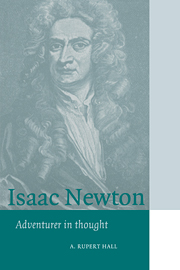Book contents
- Frontmatter
- Contents
- List of Figures
- General Editor's Preface
- Foreword
- Acknowledgement
- 1 The Hopeful Youth, 1642–1664
- 2 “The prime of my age for invention”, 1664–1667
- 3 Widening Horizons, 1667–1669
- 4 The Professor of Mathematics, 1669–1673
- 5 Publication and Polemic, 1672–1678
- 6 Life in Cambridge, 1675–1685
- 7 The Chemical Philosopher, 1669–1695
- 8 The Mathematical Principles of Natural Philosophy, 1679–1687
- 9 Private and Public life, 1685–1696
- 10 Fluxions and Fury, 1677–1712
- 11 Opticks, or a Treatise of Light, 1687–1704
- 12 Life in London, 1696–1718
- 13 A Man of Authority and Learning, 1692–1727
- 14 Later Books, 1706–1726
- 15 Kensington, 1725–1727
- Appendices
- Notes
- Bibliography
- Index
9 - Private and Public life, 1685–1696
Published online by Cambridge University Press: 12 January 2010
- Frontmatter
- Contents
- List of Figures
- General Editor's Preface
- Foreword
- Acknowledgement
- 1 The Hopeful Youth, 1642–1664
- 2 “The prime of my age for invention”, 1664–1667
- 3 Widening Horizons, 1667–1669
- 4 The Professor of Mathematics, 1669–1673
- 5 Publication and Polemic, 1672–1678
- 6 Life in Cambridge, 1675–1685
- 7 The Chemical Philosopher, 1669–1695
- 8 The Mathematical Principles of Natural Philosophy, 1679–1687
- 9 Private and Public life, 1685–1696
- 10 Fluxions and Fury, 1677–1712
- 11 Opticks, or a Treatise of Light, 1687–1704
- 12 Life in London, 1696–1718
- 13 A Man of Authority and Learning, 1692–1727
- 14 Later Books, 1706–1726
- 15 Kensington, 1725–1727
- Appendices
- Notes
- Bibliography
- Index
Summary
Humphrey Newton's Recollections
In the last year of the reign of King Charles II, according to his own recollection, Humphrey Newton came to Trinity College, Cambridge, from Grantham School to be sizar to his great namesake, Isaac. Neither Newton admitted or claimed relationship with the other. Humphrey remained with Isaac for five years before returning to Grantham as a country physician, during which period he lived in some intimacy with the Lucasian Professor, chiefly serving as his copyist. John Conduitt, after Isaac's death, sought in 1728 Humphrey's recollections of him, first published by Brewster in 1855. With all its obvious imperfections and silliness, Humphrey's is the only personal record of Newton's daily life from someone who had every opportunity for close and long observation.
Humphrey was much more struck by Newton's manners than by his mind, which was beyond his appreciation. His only memory of the Principia, after having copied it, was that some of the scholars in Cambridge to whom Newton bade him take presentation copies, declared ‘that they might study seven years before they understood any thing of it’. (They might have spent seven years in worse ways.) He remembered that Newton kept a five-foot-long [refracting] telescope at the head of the stairs leading from his rooms to the garden below, but all he could say of Newton's study of astronomy was that ‘several of his observations about comets and the planets may be found scattered here and there in a book entitled The Elements of Astronomy by Dr. David Gregory.’
- Type
- Chapter
- Information
- Isaac NewtonAdventurer in Thought, pp. 225 - 248Publisher: Cambridge University PressPrint publication year: 1996

